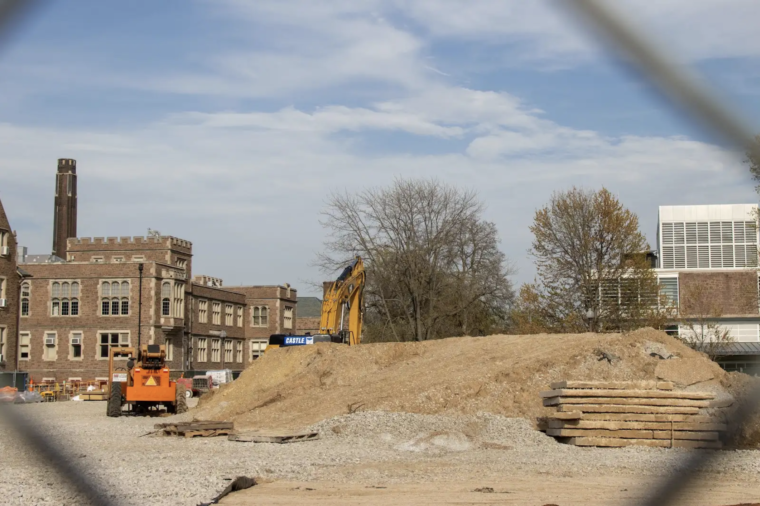Facilities and Construction | News
WashU set to reopen Mudd Field and pause construction on Riney Hall

While ground was broken in October at Riney Hall’s construction site, the project has now been put on pause due to funding cuts. (Sydney Tran | Editor-in-Chief)
In response to uncertainties regarding federal funding, WashU is halting its plans to remodel Mudd Field and to build Riney Hall, according to an article published in The Record. The University will start removing the fencing on Mudd Field in the coming weeks, and the field will fully reopen for regular use at the start of next semester. Construction on Michael W. and Quirsis V. Riney Hall, a new Arts & Sciences building that broke ground this fall, will be paused this week. Despite the halt in construction, University officials expressed interest in revisiting the two projects in the future.
The decision to pause construction projects comes as WashU and many universities across the nation deal with funding cuts as a result of the Trump administration’s policies. Reductions in research funding and a potential increase in taxes on the University’s endowment have forced WashU to adjust its financial planning. In addition to halting construction projects, the University has also limited hiring of new faculty and staff and reduced the number of students admitted to some graduate programs.
“We regret that it’s necessary to take these actions, but in our current climate, it is simply not prudent to continue with these projects as scheduled,” Chancellor Andrew Martin told The Record. “Given the uncertainty around federal research funding and other potential government actions, we have to take a careful look at every aspect of our operations. We hope that once we have a clearer sense of the financial picture, we may be able to revisit some of these investments.”
The University planned to fully close Mudd Field after Commencement in May and to keep the space closed until 2028 to create a new “social green” space, add new trees and landscaping, and build pathways connecting the north and south sides of campus. Many students expressed disappointment about the extended closure of the field, while administrators said that the construction would improve the field in the long term.
Although WashU began fencing off areas of the field in March, construction was slated to begin in earnest over the summer. Instead, the University will remove fencing in the coming weeks and will reopen the space for full use at the start of the fall semester.
Riney Hall was set to be the University’s new home for the Department of Sociology and the Department of African and African-American Studies. The building was described as “the crown jewel of Arts & Sciences” by Dean of Arts & Sciences Feng Sheng Hu and would have hosted the Center for Undergraduate Advising in Arts & Sciences, the Office of Graduate Studies, and “The Incubator,” a space dedicated to faculty research.
Work on Riney Hall broke ground in October. Now, the University is shutting down construction, and it remains unclear when, or if, the work will be continued in the future.
“While of course we’re disappointed that construction on Riney Hall is being paused, we understand that this is a necessary and wise course of action for the University,” Hu told The Record. “When the time is right, we look forward to continuing the conversation about our path forward together.”
Julie Flory, Vice Chancellor for Marketing and Communications, wrote that a portion of the fencing around the Riney Hall construction site will be removed before the Commencement ceremony in May. Flory added that she is not aware of any changes to other projects such as planned development on the Concordia and Fontbonne campuses.
Though it is unclear exactly how much the University will lose as a result of federal funding cuts, the cutback in government spending under the Trump administration will likely lead to significant reductions to the University’s funding. WashU received over $1 billion in external research funding in 2024, including $683 million from the National Institutes of Health. In February, the NIH announced a $4 billion research funding cut, including a cap on the indirect cost rate on all new and current grants.
Additionally, WashU has around $12 billion in its endowment as of June 2024, but proposals from Republicans in Congress to raise the endowment tax on Universities with large endowments from 1.4% to 10% or higher could weaken the financial position of universities like WashU. As the University continues to evaluate its long-term planning in the face of significant funding cuts, Martin reaffirmed his belief in the WashU community’s strength.
“It’s difficult to take these steps, but we must carefully weigh a number of competing priorities and determine when the time is right for large capital projects,” Martin told The Record. “We know we are resilient, and we will weather this storm as we always do — together, and with concern for one another and WashU, the institution that means so much to us all.”
